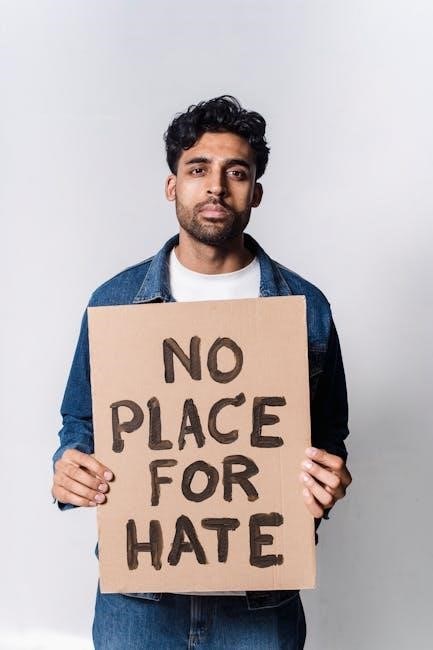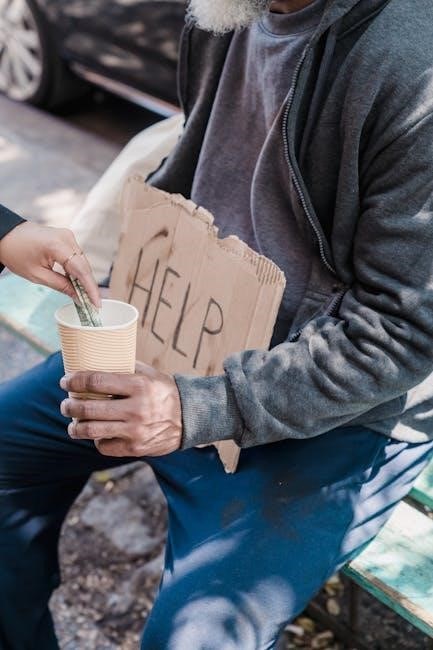Survivor guilt is a complex emotional and moral phenomenon, often arising from traumatic events. It involves intense feelings of self-blame and empathy, shaping moral character and relationships. This guilt reflects a deep sense of responsibility and the need for moral repair, highlighting its profound ethical significance in understanding human behavior and emotional responses to survival.
1.1 Defining Survivor Guilt and Its Psychological Roots
Survivor guilt, a profound emotional response, emerges when individuals feel culpable for surviving traumatic events while others perish. Rooted in empathy and self-responsibility, it often arises in war, accidents, or disasters. Psychologically, it stems from a clash between moral expectations and uncontrollable circumstances, leading to self-blame and a need for moral repair. This emotional conflict reflects a deep sense of duty and connection to others, highlighting the complex interplay between guilt, responsibility, and human relationships in the aftermath of tragedy.
1.2 The Moral Significance of Survivor Guilt in Different Contexts
Survivor guilt holds profound moral significance across various contexts, from war to natural disasters. It reflects a sense of responsibility and empathy, often leading to moral repair efforts. In war, soldiers feel guilt for surviving while comrades perish, highlighting the bond of duty and love. Civilians in disasters may experience similar emotions, emphasizing shared humanity. This guilt underscores the ethical importance of acknowledging loss and fostering compassion, revealing how moral emotions shape character and relationships in the face of tragedy, while also imposing moral order on chaotic events.

The Psychological Origins of Survivor Guilt
Survivor guilt stems from psychological conflicts, including empathy, self-responsibility, and irrational beliefs about luck and control, often intensifying in traumatic situations like war, where soldiers grapple with loss and perceived failure despite no wrongdoing, leading to enduring emotional distress and a complex interplay of emotions that shape their mental health and moral perceptions long after the events have passed.
2.1 Survivor Guilt in War Veterans: Case Studies and Examples
Captain Adrian Bonenberger and Specialist Jeremiah Pulaski’s story illustrates survivor guilt in war veterans. Pulaski saved Bonenberger’s life twice but later died in a bar fight, leaving Bonenberger with deep guilt. Similarly, Captain John Prior grappled with guilt after Private Joseph Mayek’s accidental death due to a faulty battery. These cases reveal how soldiers often feel responsible for tragedies beyond their control, experiencing emotional distress and a need for moral repair. Such examples highlight the psychological toll of survivor guilt, emphasizing its complexity and enduring impact on veterans’ lives and moral struggles.
2.2 The Role of Empathy and Self-Responsibility in Survivor Guilt
Empathy and self-responsibility are central to survivor guilt, often leading individuals to feel a moral obligation toward those who did not survive. Soldiers, like Captain John Prior, experience profound empathy with victims and their families, intensifying feelings of guilt. This emotional connection drives a sense of self-responsibility, even when events are beyond their control. Such dynamics highlight how survivor guilt is not just a psychological response but a deeply moral one, reflecting a desire to honor lost comrades and find meaning in their survival. This interplay of empathy and responsibility underscores the ethical complexity of survivor guilt.
Philosophical Perspectives on Survivor Guilt
Philosophers like Aristotle and Bernard Williams explore survivor guilt through concepts of virtue and “agent-regret,” revealing its moral complexity and emotional depth in human experiences.
3.1 Aristotle’s Concept of Virtue and Emotional Conflict
Aristotle’s Nicomachean Ethics highlights virtue as encompassing both actions and emotions. Survivor guilt reflects a conflict between moral ideals and circumstances, aligning with Aristotle’s view of virtue as a balance between emotional and rational responses. The anguish of guilt, rooted in empathy and self-responsibility, mirrors Aristotle’s emphasis on character and ethical dilemmas. This emotional struggle embodies the tension between what one values and the inability to act, illustrating how survivor guilt serves as a testament to the complexity of human morality and the enduring relevance of Aristotelian thought in understanding emotional and ethical conflicts;
3.2 Bernard Williams’ Idea of “Agent-Regret” and Its Relevance
Bernard Williams’ concept of “agent-regret” describes guilt felt when one is causally linked to harm, despite lacking moral culpability. This idea resonates deeply with survivor guilt, where individuals grapple with circumstances beyond their control. Williams’ term captures the emotional weight of responsibility, distinguishing it from ordinary regret. In contexts like war, agent-regret reflects soldiers’ profound remorse for losses they couldn’t prevent, highlighting the moral complexity of such feelings. This concept underscores how survivor guilt, while often irrational, serves as a testament to the depth of human empathy and the enduring quest for moral understanding in the face of tragedy.

Real-Life Examples and Stories of Survivor Guilt
Survivor guilt is vividly illustrated through stories of war veterans, such as Captain Adrian Bonenberger and Specialist Jeremiah Pulaski, highlighting the emotional burden of survival and loss.
4.1 The Story of Captain Adrian Bonenberger and Specialist Jeremiah Pulaski
Captain Adrian Bonenberger and Specialist Jeremiah Pulaski’s story exemplifies the profound impact of survivor guilt. In Afghanistan, Pulaski twice saved Bonenberger’s life, but Bonenberger was unable to help Pulaski when he faced trouble after returning home. Pulaski was killed in a bar fight, leaving Bonenberger with overwhelming guilt. Despite acknowledging the irrationality of his feelings, Bonenberger felt responsible, highlighting the emotional burden of survival and the moral conflict of feeling culpable for events beyond one’s control. This story underscores the complex interplay of empathy, responsibility, and the enduring weight of survivor guilt.
4.2 The Case of Captain John Prior and the Death of Private Joseph Mayek
Captain John Prior faced profound survivor guilt after Private Joseph Mayek’s death in Iraq. A faulty battery caused a Bradley vehicle’s gun to misfire, fatally injuring Mayek. Prior, who authorized the battery’s use, grappled with guilt despite being exonerated. He reflected on the series of decisions leading to the accident, feeling responsible for Mayek’s death. Prior sought moral repair by connecting with Mayek’s mother, illustrating how guilt can drive acts of empathy and redemption. His experience highlights the enduring emotional and moral impact of such tragedies on those who survive.

The Moral Logic of Survivor Guilt
Survivor guilt serves as a form of empathic distress, enabling individuals to impose moral order on chaotic events and find meaning in their survival.
5.1 The Concept of “Moral Repair” and Its Importance
Moral repair is a process through which individuals address feelings of guilt by taking actions that restore their moral equilibrium. It involves acknowledging the moral weight of survival and acting to honor the memory of those lost. This concept emphasizes the importance of empathy, responsibility, and making amends, even when culpability is absent. Moral repair fosters healing and reaffirms one’s moral character, enabling survivors to navigate the ethical complexities of their experiences and find meaning in their continued existence.
5.2 How Survivor Guilt Shapes Moral Character and Relationships
Survivor guilt profoundly impacts moral character by fostering empathy, self-reflection, and a heightened sense of responsibility. It often leads individuals to reevaluate their values and actions, promoting personal growth and ethical awareness. In relationships, survivor guilt can deepen connections through shared experiences and mutual understanding, while also creating challenges as individuals grapple with feelings of unworthiness. This emotional dynamic shapes how survivors perceive themselves and others, influencing their social bonds and moral agency in a complex interplay of guilt, empathy, and the pursuit of redemption.

The Redemptive Aspect of Survivor Guilt
Survivor guilt can foster redemption by driving individuals to seek moral repair, honor lost loved ones, and rebuild meaningful connections, transforming pain into purposeful actions and growth.
6.1 Survivor Guilt as a Form of Empathic Distress
Survivor guilt often manifests as empathic distress, where individuals deeply feel the suffering of others, even those they couldn’t save. This emotional connection highlights the moral weight of their experiences. By sharing the pain of loss, survivors attempt to honor the memory of those who perished, creating a bridge between their own survival and the tragedy. This empathy-driven guilt serves as a testament to the enduring bonds of compassion and shared humanity, even in the face of overwhelming adversity and moral complexity.
6.2 The Role of Guilt in Imposing Moral Order on Chaos
Survivor guilt plays a crucial role in imposing moral order on chaotic situations, providing a sense of structure and meaning amidst randomness. By feeling responsible for events beyond their control, individuals attempt to make sense of tragedy, creating a narrative of moral accountability. This guilt often emerges as a way to honor the memory of those lost, ensuring their sacrifice is not in vain. Through this process, survivors reconstruct a moral framework, transforming chaotic events into a coherent, albeit painful, story. This imposition of order helps individuals cope with grief and rebuild their moral and emotional stability.

Criticism and Counterarguments
Critics argue survivor guilt is often irrational, stemming from feelings of responsibility for uncontrollable events. Some view it as misplaced, while others defend it as a moral compass, emphasizing empathy and accountability.
7.1 The Irrationality of Survivor Guilt: Philosophical Debates
Philosophers like Nietzsche argue that survivor guilt often lacks rational basis, as individuals feel responsible for events beyond their control. This “bad conscience” arises not from wrongdoing but from circumstances. Bernard Williams’ concept of “agent-regret” further explores this, suggesting guilt can stem from unintended consequences. Critics contend that such guilt, while emotionally genuine, may not align with moral accountability, highlighting the tension between emotional and rational evaluations of responsibility.
7.2 The Potential Negative Consequences of Survivor Guilt
Survivor guilt can have detrimental effects on mental health, leading to prolonged emotional distress and self-blame. It may impair daily functioning and strain relationships, as individuals struggle with feelings of unworthiness; In extreme cases, it can contribute to depression or self-destructive behaviors, hindering personal growth and healing. While guilt may serve as a moral compass, its excessive presence can obstruct recovery, emphasizing the need for balance in addressing survivor guilt constructively.
Survivor guilt is a multifaceted phenomenon with profound moral and emotional implications. Addressing it requires empathy, understanding, and support to foster healing and moral growth.
8.1 The Broader Significance of Survivor Guilt in Society
Survivor guilt extends beyond individual experiences, resonating deeply within societal structures. It reflects collective moral consciousness, fostering empathy and unity. By addressing survivor guilt, societies can promote healing, understanding, and ethical growth, ultimately strengthening communal bonds and fostering a culture of compassion and shared responsibility.
8.2 The Importance of Addressing Survivor Guilt in Healing Processes
Addressing survivor guilt is crucial for fostering emotional and moral healing. By acknowledging and understanding these feelings, individuals can navigate their moral conflicts and work towards repair. This process not only alleviates personal anguish but also strengthens relationships and societal bonds, emphasizing the need for empathy and support in healing journeys.
